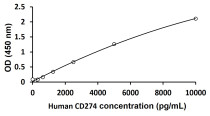ARG83029
Human CD274 / PD-L1 ELISA Kit
Human CD274 / PD-L1 ELISA Kit for ELISA and Human
Overview
| Product Description | ARG83029 Human CD274 / PD-L1 ELISA Kit is an Enzyme Immunoassay kit for the quantification of Human CD274 / PD-L1 in serum, plasma (heparin), ascites, urine and cell culture supernatants. |
|---|---|
| Tested Reactivity | Hu |
| Tested Application | ELISA |
| Specificity | Not cross-reacts with: Human IL2, IL4, IL6, IL10,TNF alpha, TNF beta,PD1. Mouse IL2, IL4, IL5, IL6, IL8, IL10, IL12, PD1,PDL1. Rat IL2, PD1,PDL1. |
| Target Name | CD274 / PD-L1 |
| Conjugation | HRP |
| Conjugation Note | Substrate: TMB and read at 450 nm. |
| Protein Full Name | Programmed cell death 1 ligand 1 |
| Sensitivity | 78 pg/ml |
| Sample Type | Serum, plasma (heparin), ascites, urine and cell culture supernatants. |
| Standard Range | 156.3 - 10000 pg/ml |
| Sample Volume | 100 µl |
| Precision | Intra-Assay CV: less than 10% Inter-Assay CV: less than 10% |
| Alternate Names | CD274, CD274 Molecule, PDL1, B7H, PDL1, Programmed Cell Death 1 Ligand 1, CD274 Antigen , B7 Homolog 1, PDCD1LG1, B7 H1, B7 H, PDCD1 Ligand 1, PDCD1L1, HPD-L1, Programmed Death Ligand 1 |
Application Instructions
| Assay Time | ~ 4 hours |
|---|
Properties
| Form | 96 well |
|---|---|
| Storage Instruction | Store the kit at 2-8°C. Keep microplate wells sealed in a dry bag with desiccants. Do not expose test reagents to heat, sun or strong light during storage and usage. Please refer to the product user manual for detail temperatures of the components. |
| Note | For laboratory research only, not for drug, diagnostic or other use. |
Bioinformation
| Database Links | |
|---|---|
| Gene Symbol | CD274 |
| Gene Full Name | CD274 Molecule |
| Background | This gene encodes an immune inhibitory receptor ligand that is expressed by hematopoietic and non-hematopoietic cells, such as T cells and B cells and various types of tumor cells. The encoded protein is a type I transmembrane protein that has immunoglobulin V-like and C-like domains. Interaction of this ligand with its receptor inhibits T-cell activation and cytokine production. During infection or inflammation of normal tissue, this interaction is important for preventing autoimmunity by maintaining homeostasis of the immune response. In tumor microenvironments, this interaction provides an immune escape for tumor cells through cytotoxic T-cell inactivation. Expression of this gene in tumor cells is considered to be prognostic in many types of human malignancies, including colon cancer and renal cell carcinoma. Alternative splicing results in multiple transcript variants. [provided by RefSeq, Sep 2015] |
| Function | The PDCD1-mediated inhibitory pathway is exploited by tumors to attenuate anti-tumor immunity and escape destruction by the immune system, thereby facilitating tumor survival. The interaction with PDCD1/PD-1 inhibits cytotoxic T lymphocytes (CTLs) effector function (By similarity). The blockage of the PDCD1-mediated pathway results in the reversal of the exhausted T-cell phenotype and the normalization of the anti-tumor response, providing a rationale for cancer immunotherapy.[UniProt] |
| Cellular Localization | Cell membrane, Early endosome membrane, Recycling endosome membrane. [UniProt] |
| Highlight | Related products: PD-L1 antibodies; PD-L1 ELISA Kits; Related news: Detecting exosomal PD-L1 secreted by cancer cells The best solution for PD-1/PD-L1 research Examining CTL/NK-mediated cytotoxicity by ELISA New ELISA data calculation tool: Simplify the ELISA analysis by GainData |
| PTM | Ubiquitinated; STUB1 likely mediates polyubiquitination of PD-L1/CD274 triggering its degradation. [Uniprot] |
Images (1) Click the Picture to Zoom In
Specific References
| Title | Download Link |
|---|---|
| ARG83029 Human CD274 / PD-L1 ELISA Kit User manual |
 Download Download
|








